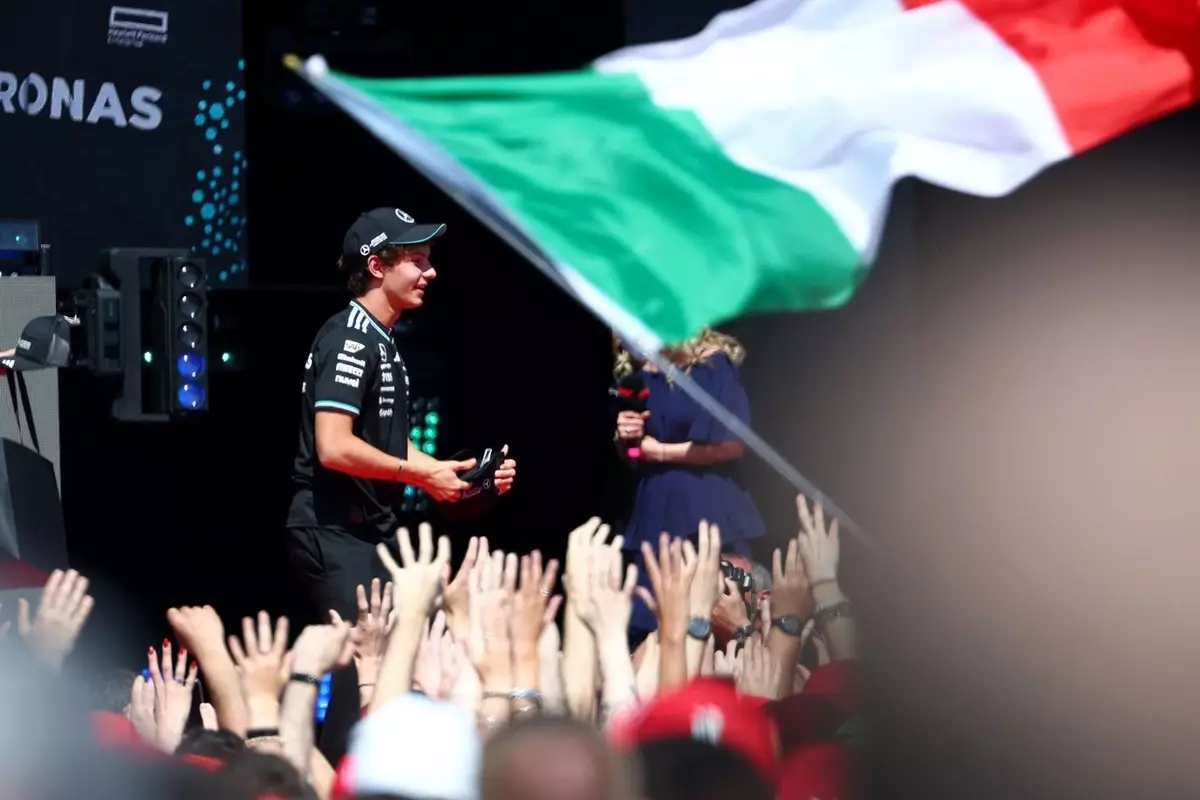Young talent Andrea Kimi Antonelli recently faced a complex array of challenges during his return to Italy for the Formula 1 Grand Prix at Imola. As a burgeoning star under the prestigious Mercedes banner, the weight of expectation was immense. Not only was it his first experience racing on home soil, but it was also an opportunity laden with personal significance, being merely a stone’s throw from his hometown of Bologna. Yet, what could have been a triumph turned out to be an awakening about the multifaceted nature of Formula 1 racing, one that extends beyond mere driving skill.
The anticipation leading up to this weekend was palpable. Antonelli had celebrated Bologna FC’s domestic cup success, a reminder of the vibrant sporting culture that permeates his hometown. He even extended invitations to his classmates, embodying the spirit of camaraderie. However, the realities of the race weekend soon emerged; he struggled with confidence on Saturday, and the race itself was marred by technical issues, culminating in an unfortunate retirement. This event could have easily discouraged a 18-year-old embarking on a high-stakes career, but it revealed an opportunity for growth instead.
The Struggles Behind the Spotlight
For Antonelli, the glitz and glam of Formula 1 can often be overshadowed by the pressure it brings. Despite holding his own against seasoned competitor Lewis Hamilton initially, the throttle issue served as an unwelcome reminder that talent alone does not guarantee success at this level. While his teammate George Russell managed to secure a seventh-place finish, Antonelli’s race was abruptly cut short. The incident highlighted the volatile nature of racing and the constant need for technical reliability—a factor that weighs heavily on any driver, especially one still carving out a space in the white-hot cauldron of F1.
In interviews after the race, Antonelli candidly revealed that the sheer energy drain from managing fan interactions had blurred his focus. Engaging with fans, taking selfies, and distributing autographs are part and parcel of being a modern athlete, yet they can distract from the main objective: performing on the track. Antonelli recognized this as a learning experience, admitting that he struggled to balance his commitments in the paddock with his need for mental clarity. This authenticity resonates with fans; not only does it humanize a seemingly invincible figure, but it also underscores the complexities of maintaining peak performance under pressure.
A Fight for Balance and Focus
Antonelli’s reflections turned toward the lessons learned, asserting the need for better self-management in the future. He articulated a vital takeaway: the importance of saying “no” at times to safeguard one’s focus and energy. This self-awareness is rare among rookies and speaks to Antonelli’s maturity. It’s essential to recognize that thriving in Formula 1 is not simply about speed; it’s also about mental resilience and managing external pressures.
Bradley Lord, a representative for Mercedes, echoed these sentiments, emphasizing that the team would benefit from reevaluating Antonelli’s schedule. As the youngest driver on the grid, the responsibility rests not only on Antonelli’s shoulders but on the entire team. The balance between fostering public relations and focusing on performance can be precarious, demanding strategic adjustments to support Antonelli’s development.
Looking Ahead: A Case for Growth
As the focus shifts toward the next race in Monaco, Antonelli’s experience at Imola will undoubtedly serve as a reference point for his future endeavors. Monaco, with its tight corners and demanding nature, presents a different set of challenges that require not just driving skill but strategic thinking and mental fortitude. In acknowledging this pressure, Antonelli can adopt a productive mindset that allows him to channel past experiences into improvement.
The narrative surrounding Antonelli is not just about the immediate results; it’s about his journey and evolution as a driver. Races are not merely contests of speed but events filled with learning opportunities. This understanding places Antonelli in a unique position to become not only a formidable competitor but also a resilient one who can flourish under pressure. The lessons learned at Imola, although difficult, offer critical insights that could shape the future of his budding career.
As spectators, we have the privilege to observe this young talent navigate through adversity and growth, cheering him on as he evolves into the driver he aspires to be. Each challenge not only refines his skills but enriches his journey, steering him toward greater achievements in his racing career.

